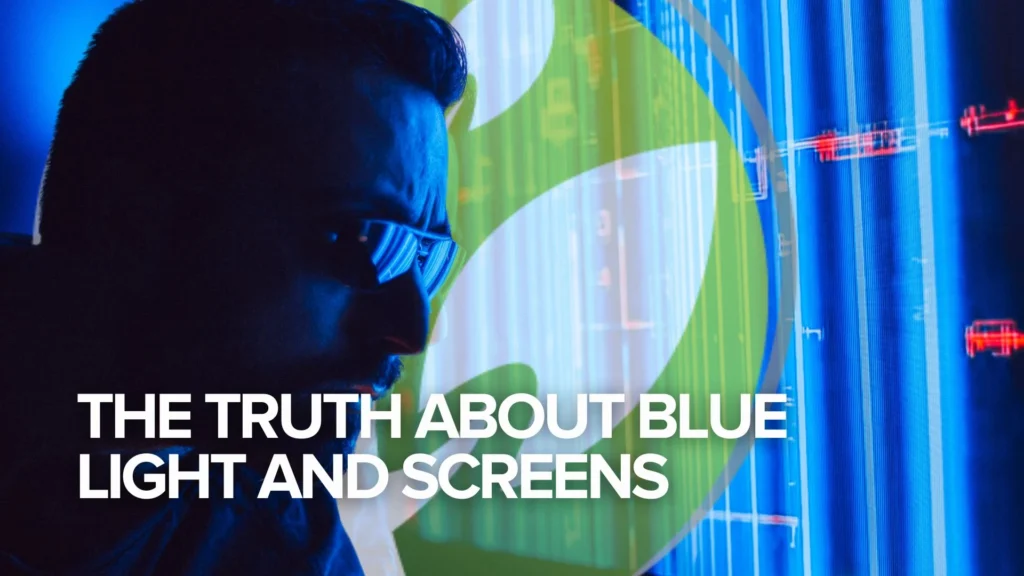It’s hard to miss the ubiquity of screens in today’s modern world. We use them to navigate while we’re in our car, we may read from them while we’re in bed, and of course, many of us spend hours each day on the computer or smartphones for our daily tasks and work.
With screentime seemingly ever-increasing, many have brought into question the physiological impact of blue light. But what is it, and how concerned should we actually be about its impact?
What is Blue Light?
Blue light is a type of visible light in the electromagnetic spectrum that’s naturally emitted by the sun, and artificially emitted by LED screens, fluorescent lighting, and digital devices.
Despite a growing industry built to ‘protect’ us from blue light, not all blue light is bad. In fact, naturally emitted blue light is vital for:
- Boosting alertness
- Elevating mood, and
- Regulating your body’s circadian rhythm (the body’s internal clock that regulates our sleep-wake cycle)
However, over-exposing ourselves to artificial blue light – especially when we do so at the wrong times – can have a detrimental effect.
How Blue Light Affects Your Body
1. Impact on Sleep
The most widely known impact of blue light is undoubtedly the effect it can have on our sleep. Blue light influences our brain’s production of melatonin, the hormone that helps us go to sleep.
So, when we expose ourselves to high levels of artificial blue light in the evening – through screens or fluorescent lighting – we can unknowingly suppress our melatonin production, delaying our sleep and disrupting the circadian rhythm of our body. In fact, even short-term exposure before bed can:
-
Reduce the quality of our sleep
-
Decrease REM sleep
-
Lengthen the time it takes for us to fall asleep
2. Eye Strain
Another potential effect of prolonged screentime is our eye health. In fact, it can lead to something now called digital eye strain, or computer vision syndrome. This can feel like:
-
Dry eyes
-
Blurred vision
-
Headaches, or
-
Difficulty focusing
And while blue light may not be the only contributing factor (screen glare, poor posture, and blinking less also play a role), it does seem to have an impact on our eye health.
3. Potential Long-Term Effects?
While there have been some studies suggesting that high levels of blue light exposure may contribute to retinal damage or age-related macular degeneration over time, much of the current data around this come from animal or laboratory research.
Nevertheless, it’s likely wise to be mindful of our eye health and take steps to care for our vision now, so we can enjoy clear, comfortable sight as we age.
Easy Ways to Support Our Eyes in a Screen-Filled World
Ditching our devices, or our lifestyle, just isn’t practical. So, what are some easy steps we can take to take appropriate care, and be smart about our screen time?
-
Blue Light Filters
Most phones, computers and tablets now have a ‘night-mode’ feature, which filters out blue light. Consider exploring Apple’s ‘Night Shift’, or Android’s ‘Night Light’ tools.
-
Time Your Screen Use Wisely
To allow the natural rise of melatonin and help ease your way into sleep, try to avoid screens one to two hours before sleep.
-
Consider the 20-20-20 Rule
Every 20 minutes, look at something 20 feet away for 20 seconds. This can reduce eye strain and keep your eyes feeling healthy.
-
Explore Blue Light Glasses
If you spend all day on screens, especially working into the evening, you might want to explore Blue Light Glasses – glasses designed especially for reducing blue-light exposure. Many report an immediate sense of relief and reduced eye strain.
-
Use NANO SOMA®
Many of our customers have shared that spraying NANO SOMA in their eyes (or putting it in an eyedropper and dropping it in their eyes) has been supportive of their eye health and vision. If you notice your eyes feeling strained, your vision feeling less sharp, or just generally want to maintain good eye health, we invite you to try it!* We have a number of testimonials on just this topic, and it is perfectly safe to use in your eyes.
Better Screens, Better Sleep, Better Balance
As our digital lifestyles evolve, it’s clear that screens aren’t going anywhere. So, understanding the risks and the myths about blue light (something we all engage with daily!) is vital as we seek balance and wellness. Whether it’s taking screen breaks, employing blue-light filters, or using NANO SOMA to support our eye health, it’s our choice to form new habits that can support us in a screen-filled world.
While it’s not about perfection, your eyes, and your sleep, will be grateful for your care.
Are You Ready To See What It Can Do For You?
Tap the button below and discover how you can!
*These statements have not been evaluated by the US Food and Drug Administration. This product is not intended to diagnose or prescribe for any medical condition, nor to prevent, treat, mitigate, or cure such condition(s). If you have any illness or medical condition, consult your healthcare provider.


